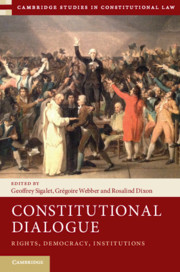Book contents
- Constitutional Dialogue
- Cambridge Studies in Constitutional Law
- Constitutional Dialogue
- Copyright page
- Contents
- Contributors
- Preface and Acknowledgements
- Note on the Cover Image
- 1 Introduction
- Part I Dialogue and Democracy
- Part II Dialogue and Institutions
- 5 Past, Present, and Justice in the Exercise of Judicial Responsibility
- 6 Constitutional ‘Dialogue’ and Deference
- 7 Dialogue, Finality and Legality
- Part III Dialogue and Rights
- Part IV Case Studies of Dialogue
- Part V International and Transnational Dialogues
- Index
7 - Dialogue, Finality and Legality
from Part II - Dialogue and Institutions
Published online by Cambridge University Press: 19 April 2019
- Constitutional Dialogue
- Cambridge Studies in Constitutional Law
- Constitutional Dialogue
- Copyright page
- Contents
- Contributors
- Preface and Acknowledgements
- Note on the Cover Image
- 1 Introduction
- Part I Dialogue and Democracy
- Part II Dialogue and Institutions
- 5 Past, Present, and Justice in the Exercise of Judicial Responsibility
- 6 Constitutional ‘Dialogue’ and Deference
- 7 Dialogue, Finality and Legality
- Part III Dialogue and Rights
- Part IV Case Studies of Dialogue
- Part V International and Transnational Dialogues
- Index
Summary
- Type
- Chapter
- Information
- Constitutional DialogueRights, Democracy, Institutions, pp. 186 - 206Publisher: Cambridge University PressPrint publication year: 2019
- 2
- Cited by

